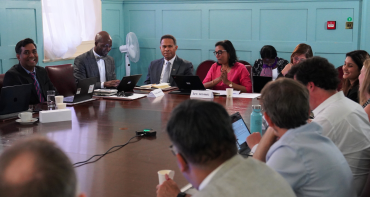Small Commonwealth states have asked the Secretariat to help them tackle the illegal arms trade and implement the Arms Trade Treaty in a more effective way.

Small Commonwealth states have asked the Secretariat to help them tackle the illegal arms trade and implement the Arms Trade Treaty in a more effective way.
In some countries the illegal trade of weapons has reached crisis proportions, according to delegates at the Meeting of Law Ministers and Attorneys General of Small Commonwealth Jurisdictions (LMSCJ) in London. Participating law ministers and attorneys general agreed to make enforcing the treaty a top priority.
At the high-level meeting, under the theme ŌĆśRule of law and sustainable developmentŌĆÖ the ╠Ūą─╠Į╗© was asked to provide assistance regarding laws to combat the illegal trade. Delegates were concerned about trans-shipment and tracking, additional police powers and sentencing guidelines.
The director of Rule of Law at the ╠Ūą─╠Į╗©, Katalaina Sapolu said: ŌĆ£The illegal import of arms and ammunition contributes to human rights abuses, conflict and instability and hinders social and economic development. ╠Ūą─╠Į╗© has expertise to better enable small jurisdictions to bring the issue under control. We can propose policy and legislative changes and provide in-country support to oversee their implementation. By working together, we can overcome the challenges of regulating the arms trade.ŌĆØ
Officials say illicit arms trade fuels criminal violence and serious domestic abuse towards women and girls. In parts of the Caribbean, gun crime is on the rise despite ongoing efforts to curtail it. Last month Trinidad and Tobago police reported a rise of about a third (32%) in the number of guns seized year on year.
Law ministers and attorneys general insisted that small states are not manufacturers or exporters of arms but suffer the consequences. They say firearms violence has a significant adverse impact on a countryŌĆÖs development and human rights and urged manufacturing and exporting countries to honour the obligations set in the treaty.
The biggest arms exporters are the USA, Russia, China, UK and France. Of these, UK and France have signed and ratified the treaty. The USA has signed the treaty but it has not been ratified while Russia and China did not sign it. The treaty legally binds signatory countries to prohibit illicit trafficking of arms and ammunition, review applications for exports of arms and conduct national export assessments on the industryŌĆÖs risks.
The Arms Trade Treaty will be high on the agenda at next yearŌĆÖs triennial meeting of Commonwealth law ministers to be held in the Bahamas.


